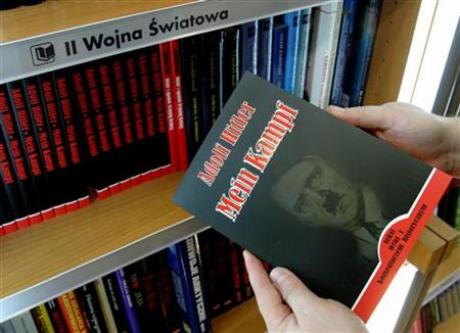


MUNICH - Although Adolf Hitler's ideological autobiography remains banned in Germany and Austria, George Tabori's stage comedy of the same name, which debuted in 1987, still is held in great esteem -- so great that it has been adapted for the screen despite its barely marketable title.
International box office prospects, already dim to begin with, are further hindered by many inside jokes and allusions to Hitler's famous speeches that work in German but probably will not survive dubbing or subtitling.
The film, which recently screened at the Munich International Film Festival, opens in November in Germany.
The film centers on a young Hitler (Tom Schilling), a budding painter of great ambition and little talent, as he moves into a Vienna boardinghouse during the early 1900s. Despite his abrasiveness and poorly hidden anti-Semitism, he is befriended by Jewish bible salesman Schlomo Herzl (Gotz George), who does his best to shield the bitter young man from the inevitable disappointment as an artist and helps him cope with his loveless childhood.
But to no avail: Driven by an egomaniacal evil, Hitler delights in turning his own misfortunes into reasons to torment the older man, climaxing in his successful effort to turn his secret love, the lovely Gretchen (Anna Unterberger), against Schlomo.
What sounds like a coherent plot, and was by all accounts a hilarious success onstage, becomes less so in Urs Odermatt's uninspired cinematic version. Unable to find a functioning rhythm for the zingers and barbs during Hitler and Schlomo's encounters, Odermatt just fast-forwards through them, having his actors deliver the lines in a matter fitting for a to-do list.
He certainly is not helped by his two leads: Schilling, apparently unable to channel the early seeds of Hitler's evil, seems to have taken his inspiration from the Nuremberg rallies instead, delivering every other line like he's addressing thousands of brown-shirts, and veteran actor George hams it up with a gusto better left for summer stock.
This is somewhat remedied by a better-than-usual supporting cast, with Bernd Birkhahn and Elisabeth Orth taking over the metaphorical roles of God and Death, respectively, with subtlety and charm. Stage actress Unterberger, whose only other feature credit to date is Oskar Roehler's "Jew Suss: Rise and Fall," clearly shows big-screen potential.
Envisioned as a parable about good and evil, one might forgive "Mein Kampf" for not giving us any insights, real or imagined, into Hitler's youth and the time he grew up in -- especially because this was more than adequately done in Menno Meyjes' "Max" in 2002. Unfortunately, this cannot be said for Odermatt's failure to make the play come alive onscreen.
His backdrops might not be painted, the clothes a little more accurate and occasionally the camera moves from A to B, but apart from these little tweaks, the result still is a play someone filmed, as opposed to a film based on stage material.
Jo Molitoris' camerawork is adequate but uninspired, and composer Enis Rotthoff's spot-on score is one of the more cinematic elements of the film, moving the story along when the plot does not and fishing for emotions where needed.